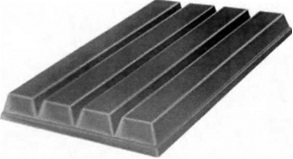The European Court of Justice (ECJ) has held that, in order to be accepted for registration as a EU trademark, a sign must have distinctive character, inherent or acquired through use, throughout the European Union and not only in a substantial part or the majority of that territory.
But does it imply that such evidence is required for each and every member state?
It has already been ruled that given its unitary nature, the territorial borders of the Member States should be disregarded in the assessment of whether a EUTM has been put to “genuine use in the Community” (ECJ, 19 December 2012, case C‑149/11, ONEL, Leno Merken BV v/ Hagelkruis Beheer BV).
For the purposes of assessing the acquisition of distinctive character through use, the ECJ upheld the judgment of the General Court in the “Lindt Rabbit” case, ruling “that the mark must have acquired distinctive character in use throughout the Union”, but added by an unclear formula that “it would be unreasonable to require proof of such acquisition for each individual Member State” (GC, 10 Dec. 2010, case T-336/08, Chocoladefabriken Lindt & Sprüngli v OHIM (shape of a chocolate rabbit with red ribbon), confirmed by ECJ, 24 May 2012, case C-98/11 P).
The ECJ clarified its case-law, in a case concerning the validity of the registered figurative trademark representing the shape of KITKAT chocolate bars.

Before the EUIPO Board of Appeal, it had been established that the mark at issue had acquired distinctive character through use in Denmark, Germany, Spain, France, Italy, the Netherlands, Austria, Finland, Sweden and the United Kingdom, which could be considered as a significant proportion of the relevant public throughout the European Union.
The General Court (GC, 15 Dec. 2016, case T-112/13) considered that it follows from the unitary character of the EUTM that, in order to be accepted for registration, a sign must have distinctive character throughout the whole European Union. A mark must not be registered if it is devoid of distinctive character, even in part of the European Union.
The ECJ (25 July 2018, cases C‑84/17 P, C‑85/17 P and C‑95/17 P) confirmed this position and specified some criteria for the assessment of the evidence provided:
“No provision of Regulation No 207/2009 requires that the acquisition of distinctive character through use be established by separate evidence in each individual Member State. Therefore, it is not inconceivable that the evidence provided to establish that a particular sign has acquired distinctive character through use is relevant with regard to several Member States, or even to the whole of the European Union.
In particular, as the Advocate General stated, in essence, in point 78 of his Opinion, it is possible that, for certain goods or services, the economic operators have grouped several Member States together in the same distribution network and have treated those Member States, especially for marketing strategy purposes, as if they were one and the same national market. In such circumstances, the evidence for the use of a sign within such a cross-border market is likely to be relevant for all Member States concerned.
The same is true when, due to a geographic, cultural or linguistic proximity between two Member States, the relevant public of the first has a sufficient knowledge of the products and services that are present on the national market of the second.
It follows from those findings that, although it is not necessary, for the purposes of registering, on the basis of Article 7(3) of Regulation No 207/2009, a mark that is, ab initio, devoid of distinctive character throughout all the Member States of the European Union, that evidence be submitted, in respect of each individual Member State, of the acquisition by that mark of distinctive character through use, the evidence submitted must be capable of establishing such acquisition throughout the Member States of the European Union.”
This decision brings some beneficial elements of clarification. It remains that it will be extremely difficult to obtain the registration of a EUTM devoid of distinctive character, except in exceptional cases of well-known marks.
© [INSCRIPTA]


